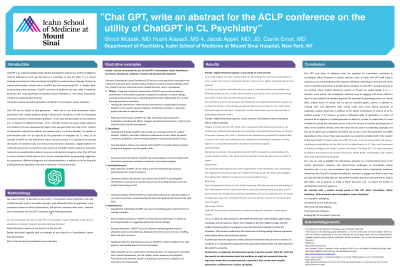Systems-Based Practice and Administrative Psychiatry
Session: Poster Session
(187) "Chat GPT, write an abstract for the ACLP conference on the utility of ChatGPT in C-L Psychiatry"

Trainee Involvement: Yes
.jpg)
Shruti Mutalik, MD (she/her/hers)
Transplant and Consultation Liaison Psychiatrist, Mount Sinai Hospital
Assistant Professor of Psychiatry, Icahn School of Medicine at Mount Sinai
Woodside, New York, United States- HA
Husni Alasadi, n/a
Medical student
Icahn School of Medicine at Mount Sinai
NY, New York, United States - JA
Jacob M. Appel, MD, JD
Associate Professor of Psychiatry
Icahn School of Medicine at Mount Sinai
New York, New York, United States - CE
Carrie Ernst, MD
Director, CL Psychiatry Fellowship, Mount Sinai Hospital
Icahn School of Medicine at Mount Sinai
New Rochelle, New York, United States
Presenting Author(s)
Co-Author(s)
Background/Significance: ChatGPT is an artificial-intelligence(AI) chatbot developed by OpenAI ( an artificial intelligence research laboratory) which was launched as a prototype on Nov 30, 2022. It is a natural language processing tool that uses deep learning(DL) to produce human language. People can interact with iterations of bots such as ChatGPT, the most recent being GPT - 4, Google’s Bard, by asking for assistance with various tasks such as writing personal statements, essays, letters of reference, poems, summaries, creating discussion questions, searching for drug interactions, asking for guidelines , among many other tasks. One can imagine many potential applications of ChatGPT in Medicine and Psychiatry, ranging from direct patient care to scholarly activity to reducing the burden of administrative tasks. This abstract envisions possible applications of ChatGPT in Consultation Liaison Psychiatry. We asked ChatGPT a number of questions and asked it to perform tasks of relevance in Consultation Liaison Psychiatry, including writing an abstract for the ACLP conference on its own utility in CL psychiatry, creating templates for CL notes, curbside consult questions, writing fellowship application statements, all of which we will feature in our report. Our poster thus will contain several examples of tasks performed by ChatGPT, in the academic, clinical and educational setting. The examples of writing, such as abstracts, composed by ChatGPT demonstrate it's ability to generate content that could serve as a skeleton for scholarly writing projects, and thus assist research in CL psychiatry. Large language models are known to “hallucinate”, which is a concept popularized by Google AI researchers in 2018. “Hallucinations” refer to factual errors in the generated text that are plausible but not true. These “hallucinations” more closely resemble “confabulations”. One could imagine ChatGPT as a model to illustrate certain cognitive disorders in CL psychiatry education. ChatGPT has the potential to reduce clinician burnout in CL psychiatry by reducing the burden of repetitive tasks and clinician documentation. Doximity, a digital platform for medical professionals, has launched a beta version of a ChatGPT tool for doctors to streamline tasks such as preauthorization letters to insurers, and psychiatric progress notes. ChatGPT can be used to compose fellowship applications, raising important questions. Future iterations of ChatGPT may be able to aid clinical reasoning and decision making in CL psychiatry in addition to helping compose consult notes and answer “curbside consults” by synthesizing information. Our poster serves to highlight current capabilities of generative AI as well as to pose questions for future directions of research. ChatGPT represents a new frontier in artificial intelligence innovation, which has the potential to improve patient care, assist research, reduce clinical administrative task burden and clinician burnout, and contribute to education. Lee P, Bubeck S, Petro J. Benefits, Limits, and Risks of GPT-4 as an AI Chatbot for Medicine.N Engl J Med. 2023 Mar 30;388(13):1233-1239. doi: 10.1056/NEJMsr2214184.
Methods:
Discussion:
Conclusions:
References:
https://www.doximity.com/docs-gpt

